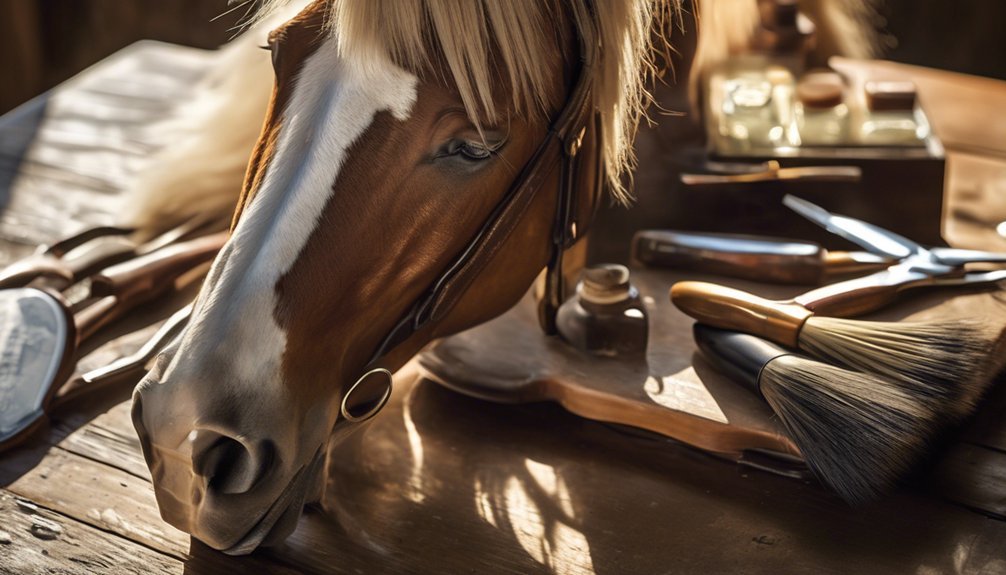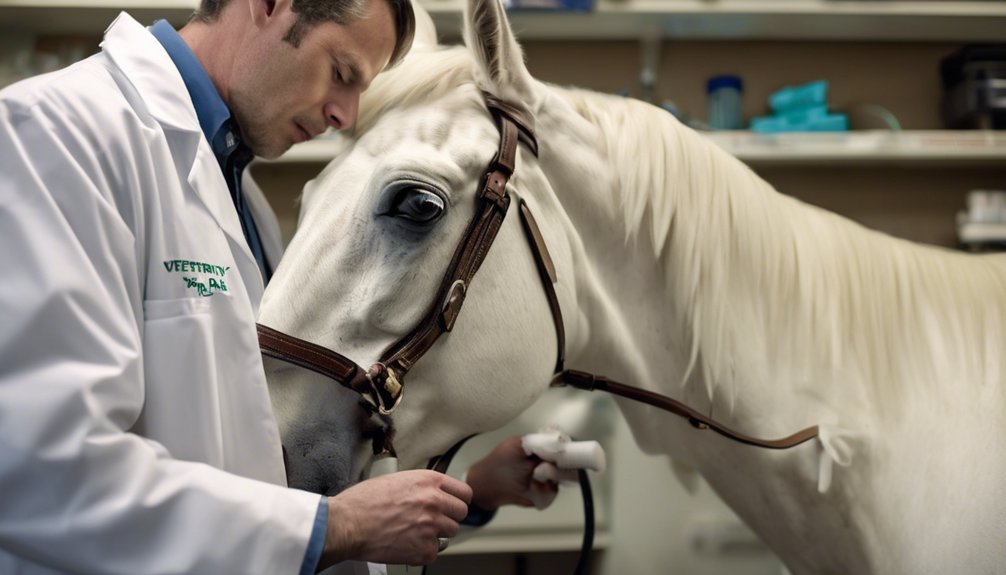
You might think horse skin care is just about looks, but it's essential for your horse's overall health. Regular grooming not only keeps their coat shiny but also helps prevent skin issues. However, knowing what to look for and which products to use can be overwhelming. Understanding the basics of skin care can make a significant difference in your horse's well-being and comfort. Let's explore the key aspects you need to consider for optimal skin health.
Key Takeaways
- Regular grooming is crucial for removing dirt, sweat, and debris, promoting overall skin health and appearance.
- Common skin issues like infections, dermatitis, and allergies require early detection through routine inspection.
- Use high-quality grooming tools to minimize skin irritation and ensure effective cleaning of different coat types.
- Choose natural conditioners and coat supplements to nourish the skin and enhance coat shine and health.
- Limit bathing frequency to prevent moisture-related issues, ensuring thorough drying afterward for optimal skin care.
Importance of Horse Skin Care

When you prioritize horse skin care, you're not just enhancing your horse's appearance; you're also promoting overall health and well-being. Maintaining skin health is essential for preventing infections, irritations, and other complications that can arise from neglect.
Regular grooming and cleaning help remove dirt, sweat, and debris, which can lead to skin issues if left unchecked. Additionally, implementing preventative measures—such as using appropriate shampoos, conditioners, and fly repellents—can protect your horse's skin from environmental stressors.
Pay attention to any changes in your horse's coat or skin, as these can signal underlying health concerns. By being proactive and attentive, you're ensuring your horse enjoys a comfortable, healthy life, free from unnecessary skin-related challenges.
Common Skin Issues in Horses
While horse skin care is vital for overall health, common skin issues can still arise, affecting your horse's comfort and well-being. Being aware of these problems helps you act quickly.
| Skin Issue | Symptoms | Treatment |
|---|---|---|
| Skin Infections | Redness, swelling, lesions | Antibiotic ointments |
| Fungal Infections | Itching, hair loss | Fungal treatments |
| Allergic Reactions | Hives, swelling, itching | Antihistamines |
| Dermatitis | Flaky, irritated skin | Medicated shampoos |
Regularly inspect your horse's skin for any signs of trouble. Prompt attention to skin infections and appropriate fungal treatments can prevent more serious complications and keep your horse feeling their best.
Essential Grooming Techniques

Maintaining your horse's skin health involves more than just addressing skin issues; routine grooming plays a significant role. Effective brushing techniques are essential to remove dirt, debris, and dead hair, promoting better skin and coat condition.
Start with a curry comb to loosen dirt, followed by a stiff brush to clear it away, and finish with a soft brush for a smooth finish. Pay attention to sensitive areas, using gentler strokes.
Regarding bathing frequency, it's important not to overdo it—too much bathing can strip natural oils. Generally, bathing every few weeks is sufficient, unless your horse gets particularly dirty.
Always dry your horse thoroughly afterward to prevent moisture-related skin issues. Consistent grooming fosters a healthy bond and enhances your horse's overall well-being.
Choosing the Right Grooming Tools
Choosing the right grooming tools is crucial for effectively caring for your horse's skin and coat. Understanding grooming tool types is essential; you'll need a curry comb for loosening dirt and hair, a stiff brush for removing debris, and a soft brush for a finishing touch.
Don't underestimate tool quality importance; high-quality tools not only last longer but also minimize skin irritation. Selecting ergonomic designs can make grooming more comfortable for both you and your horse.
Always consider your horse's specific needs, as different breeds or coat types may require specialized tools. Investing in the right grooming tools will ensure a healthier, shinier coat while strengthening the bond between you and your horse.
Best Products for Healthy Skin and Coat

To achieve and maintain a healthy skin and coat for your horse, selecting the right products is essential. Start by incorporating natural conditioners, which nourish and hydrate the skin, helping to prevent dryness and irritation.
Look for ingredients like aloe vera and coconut oil, known for their soothing properties. Additionally, consider coat supplements that provide essential fatty acids, vitamins, and minerals. These can enhance coat shine and overall health, ensuring your horse looks its best.
Regularly using these products can make a significant difference in your horse's skin health and coat condition. Remember, consistency is key; by committing to a routine with quality products, you'll cultivate a beautiful, healthy coat that reflects your horse's well-being.
Understanding Allergies and Irritations
Skin health can often be compromised by allergies and irritations, which may stem from various environmental factors, feed, or grooming products. Understanding allergy triggers is crucial for maintaining your horse's skin integrity.
Common culprits include dust, pollen, mold, and certain feed ingredients that can provoke allergic reactions. Additionally, skin irritants like harsh grooming products or insect bites can lead to discomfort and inflammation.
To protect your horse, consider using hypoallergenic products and monitoring their environment for potential allergens. Regularly inspect your horse's skin for signs of irritation, such as redness or swelling.
Seasonal Skin Care Considerations

As the seasons change, your horse's skin care routine should adapt to the varying environmental conditions that can impact skin health.
In winter, implement winter care by ensuring your horse has adequate shelter to minimize exposure to cold winds and moisture. Regularly check for dryness or cracking, and consider moisturizing products to maintain skin hydration.
During summer, take specific summer precautions to protect against sunburn and insect irritation. Use fly masks and sunscreen on sensitive areas like the muzzle and ears.
Monitor for signs of overheating and provide ample shade and fresh water.
Regular Skin Checks and Maintenance
Regularly checking your horse's skin is vital for early detection of issues that can arise throughout the year.
A consistent maintenance schedule ensures you're aware of any changes, allowing you to address potential problems promptly.
Incorporate a thorough skin inspection into your routine to maintain your horse's health.
- Look for signs of irritation or inflammation
- Check for parasites or unusual growths
- Monitor any changes in coat condition
- Assess areas prone to injury or infection
Professional Help: When to Consult a Veterinarian

When should you consider consulting a veterinarian about your horse's skin health? If you notice persistent lesions, excessive itching, or unusual changes in coat condition, it's time for a vet consultation.
Early skin assessments can prevent minor issues from escalating into serious concerns. Pay attention to signs of infection, such as swelling or discharge, as these require immediate attention.
Additionally, if your horse's skin is unresponsive to over-the-counter treatments or if you suspect allergies, a professional evaluation is crucial.
Remember, your vet's expertise can provide invaluable insights into your horse's unique needs, ensuring optimal skin health.
Don't hesitate to reach out—timely intervention can make all the difference in your horse's well-being.
Frequently Asked Questions
How Often Should I Bathe My Horse for Optimal Skin Health?
You should bathe your horse every two to four weeks for optimal skin health. Overbathing can strip natural oils, so adjust frequency based on activity level, climate, and specific skin conditions your horse may have.
Can Diet Affect My Horse's Skin Condition?
Absolutely, your horse's diet plays a crucial role in skin condition. Incorporating dietary supplements can enhance skin hydration, promoting a healthy coat and reducing irritations. A balanced diet makes a world of difference for their skin health.
Are There Home Remedies for Minor Skin Irritations?
For minor skin irritations, you can try natural treatments like aloe vera or chamomile. Additionally, soothing lotions with oatmeal or calendula can provide relief, helping your horse feel more comfortable and promoting healing.
What Signs Indicate My Horse May Have a Skin Allergy?
To determine if your horse has a skin allergy, watch for symptoms like excessive itching, redness, or swelling. Identify potential allergy triggers, such as certain foods or environmental factors, to help manage the condition effectively.
How Can I Prevent Sunburn on My Horse's Skin?
To prevent sunburn on your horse's skin, apply a UV block sunscreen specifically designed for equines. Additionally, provide shade during peak sun hours and consider protective clothing to ensure effective sun protection and minimize skin damage.
Conclusion
In the tapestry of equine care, prioritizing skin health weaves together comfort and vitality for your horse. By mastering essential grooming techniques and choosing the right products, you can create a radiant coat that reflects your dedication. Stay vigilant for signs of allergies or irritations, as these can be the whispers of deeper issues. Remember, a well-groomed horse isn't just a sight to behold; it's a testament to your commitment to their overall well-being.





